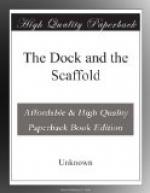The craft made three landings in Ireland, and one in England, and they were very near being captured several times. At no time were they over twelve miles from a British man-of-war, a frigate, ram, or gun-boat, and were continually annoyed by pilots. They were at sea 107 days; 38 days from America to Ireland, in which, they sailed 3,565 miles; 24 days round the coast of Ireland and England, 2,023 miles; 47 days from Ireland to America, 3,577 miles; making a grand total of 9,205 miles.
As regards the return voyage, the lecturer gave the following information:—
On the return trip they had, in starting from the coast of Ireland, one barrel sound bread, one barrel mouldy bread, one rice, pork 6 lbs., one box fish, one barrel of beef, one bushel of beans, two quarts of molasses, one-half lb. sugar, tea and coffee in sufficient quantities, one-third rations of water. They ran out of everything except bread and water before reaching the Banks of Newfoundland, where they received assistance from a fishing-smack, and again, off Boston, from a vessel bound to San Francisco. They succeeded in landing the entire cargo safely in America, and it is now in the hands of the Fenian Brotherhood.
It is a strange story altogether. The voyage of the vessel to and fro, and along the well-watched coast of Ireland, unchallenged by a British ship, is a fact of no small significance, even if it be not quite conclusive as regards the argument of the lecturer, that the Fenian Brotherhood of America can, when they please, land large supplies, men and arms, in Ireland. Then the interest of the narrative is greatly enhanced by some of its romantic incidents, more especially by the remarkable scene stated to have occurred on Easter Sunday morning.
News of the landing which had been effected near Dungarvan was quickly spread amongst the coastguards and the police, and a few hours afterwards some twenty-seven men were under arrest, charged with having come into the country under suspicious circumstances. Amongst them were two whose trials for having formed part of an armed expedition destined to aid a rebellion in Ireland, have since been had at the Commission which opened in Dublin on the 28th of November, 1867, and whose spirited defence of themselves in the dock it is our purpose to record in these pages. They were Colonel John Warren, of the American army, and Augustine E. Costello.
The trial of the first-named of those gentlemen is likely, owing to the spirited and statesmanlike course which he adopted on the occasion, to become memorable for all time, and to have a prominent place in the histories of two great nations, England and America. One of its results, now actually in progress, is an alteration in the law of America, on a point of great importance to both countries; and this alteration will necessitate a corresponding change, if not in the law, at least in the practice, of the English courts. From these changes will ensue consequences of the utmost gravity to England, but of unquestionable advantage to the Irish people, and the cause which they have at heart; for all which the name of Colonel Warren will long be held in honour and in grateful remembrance among his countrymen.




